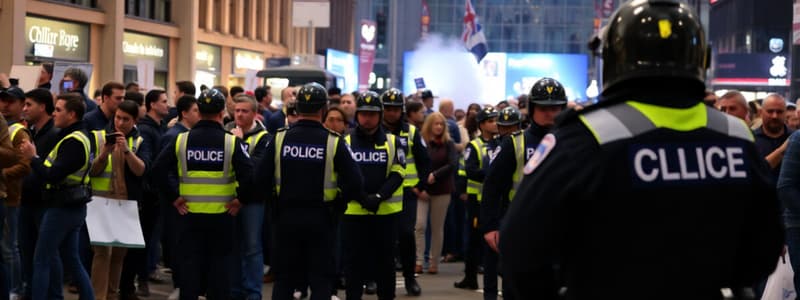Podcast
Questions and Answers
An agency is defined as a business providing a specific service such as security or ticketing.
An agency is defined as a business providing a specific service such as security or ticketing.
True (A)
A crowd controller is primarily responsible for promoting the comfort of guests at an event.
A crowd controller is primarily responsible for promoting the comfort of guests at an event.
True (A)
Employees are only those who work full-time under a fixed-term contract.
Employees are only those who work full-time under a fixed-term contract.
False (B)
The host employer is solely responsible for all logistical aspects of an event.
The host employer is solely responsible for all logistical aspects of an event.
A venue is defined as a set of practices related to event management.
A venue is defined as a set of practices related to event management.
The workplace can include a home office.
The workplace can include a home office.
Event management applies only to social gatherings like parties.
Event management applies only to social gatherings like parties.
An employee must always receive a salary or wage for their work.
An employee must always receive a salary or wage for their work.
Flashcards
Agency
Agency
An organization that provides services like event planning, security, or ticketing.
Crowd Controller
Crowd Controller
Someone responsible for security, safety, and crowd management at events.
Employee
Employee
Anyone working for payment under a contract, including full-time, part-time, and temporary employees.
Employer
Employer
Signup and view all the flashcards
Event Management
Event Management
Signup and view all the flashcards
Host Employer
Host Employer
Signup and view all the flashcards
Venue
Venue
Signup and view all the flashcards
Workplace
Workplace
Signup and view all the flashcards
Study Notes
Crowd Management Team
- Key individuals in crowd management include agencies, crowd controllers, employees, employers, event organizers, host employers, venues, and workplaces.
Agency
- In sociology and philosophy, agency is the ability of someone to act within a specific situation.
- An agency can be a business, like an event company, security service, or ticketing office, that provides a specific service.
Crowd Controller
- Crowd controllers maintain security, safety, and comfort for crowds.
- They ensure a relaxed atmosphere and provide cooling solutions.
Employee
- An employee is someone who works for a company under a contract and receives payment in exchange for their service.
- Payment can include wages, salaries, commission, or piece rates.
- Employee categories include homeworkers, those offered and accepting a job, fixed-term, seasonal, casual/part-time, and those on probation/trial periods.
Employer
- Employers are legal entities that manage and supervise workers.
- Employers are responsible for compensation, such as wages or salaries, for their employees as arranged under a contract of employment.
Events
- Event management is applying project management to large-scale events like festivals, conferences, ceremonies, or conventions.
- It involves researching the brand, targeting the right audience, planning the concept, logistics, and technical aspects of the event.
Host Employer
- Host employers are individuals, groups, or companies who initiate and fund events.
- They are responsible for generating revenue for the event.
- Funding tasks are sometimes contracted to other individuals, groups, or companies, like event companies and ticketing agencies.
Venues
- Venues are locations where events, like concerts, conferences, or sporting events, occur.
Workplace
- The workplace is the physical location where someone works.
- Workplaces can range from home offices to large office buildings or factories.
- The workplace is a crucial social space for the worker, their family, the company, its customers, and society as a whole.
Studying That Suits You
Use AI to generate personalized quizzes and flashcards to suit your learning preferences.




